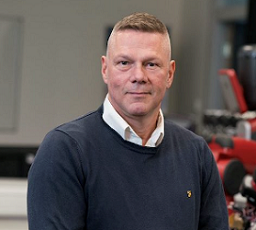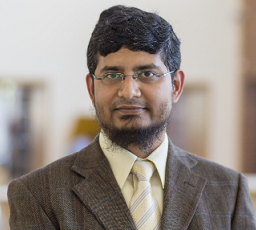Call for Participation
Inclusive Design of Educational Technologies to Support Students with Specific Learning Disabilities in Higher Education
Monday, 24 July 2023 - 08:30-12:30
David Brown
Nottingham Trent University,
Department of Computer Science, United Kingdom
david.brown@ntu.ac.uk
Mufti Mahmud
Nottingham Trent University,
Department of Computer Science, United Kingdom
mufti.mahmud@ntu.ac.uk
National reports for both India [1, 2] and Bangladesh [3, 4] highlight the exclusion of economically disadvantaged and differently-abled students [5], females [6, 7] and people from remote areas. Such students may be disadvantaged due to their gender, because they are from impoverished or remote backgrounds, etc.
In Disability Rights Group vs. UOI and Rajive Raturi vs UOI, the Supreme Court of India directed all higher education institutions to reserve 5% of places for persons with disabilities and make the institutions accessible, as mandated by the RWPD Act [8]. It has been observed that even the premier educational institutions have failed so far to implement the provisions of the RPWD Act [9].
In response, the EU-funded CBHE DiversAsia project [10] which aims to ensure that students with a range of disabilities (including those with specific learning difficulties, and sensory and physical impairments) can enjoy the same access to HE as their peers and have access to digital training materials – including open educational resources (OERs) and massive open online courses (MOOCs), and this is especially relevant to students who cannot physically access the HE Institutions due to existing architectural barriers. Investigating the potential of disruptive technologies to provide inclusive, highly immersive and personalisable learning experiences is also a core aim of this project [11].
The NMC Horizon Report - Higher Education Edition [12] highlights six important developments in assistive technology for Higher Education (HE) with indicative time frames to adoption – including Bring Your Own Device and Learning Analytics & Adaptive Learning (1 year or less), Augmented and Virtual Reality and Makerspaces (2 to 3 years), and Affective Computing and Robotics (4 to 5 years). In addition, very recent reviews examining the potential role of Artificial Intelligence (AI), the Internet of Things (IoT), Digital Twins and the Metaverse in providing Inclusive Education for students with specific learning difficulties highlight the challenges and opportunities these exciting technologies afford.
The UK Government’s report on support for disabled students in HE highlights that specific learning disabilities are the most common type of reported disabilities (34%). This includes dyslexia, dyspraxia and Attention Deficit Hyperactivity Disorder AD(H)D, with the next most commonly reported being mental health conditions [13].
Accordingly, this workshop will promote dialogue and exchange of ideas, methods, tools and guidelines between academics, researchers, students, practitioners and policymakers to guide the inclusive design of digital training materials and highly immersive and personalisable educational technologies to support the inclusion of all students with specific learning difficulties in HEIs and strive to implement the provisions of recent disability-related legislation in those contexts. Existing leading-edge practices for inclusive learning design [14] and educational technology case studies targeted at students with learning difficulties, disabilities and autism concerning the use of social robotics [15], digital game making [16], adaptive learning systems based on multimodal affect recognition [17] and virtual reality [18] will be used to help frame the discussion and flow and exchange of idea.
|
08:30 |
Start of the workshop |
|
08:30 - 08:45 |
Welcome |
|
08:45 - 09:00 |
Welcome speech |
|
09:00 - 10:30 |
Accepted paper presentations (expected 6 papers 12+3 mins each) |
|
10:30 - 11:00 |
Coffee break |
|
11:00 - 12:30 |
Panel discussion on future challenges and opportunities of inclusive higher education |
|
12:30 |
End of workshop |
Submission for the Workshop
Abstracts (800 words) should be submitted through the HCII Conference Management System (CMS).
Submission for the Conference Proceedings
The contributions to be presented in the context of Workshops will not be automatically included in the Conference proceedings.
However, after consultation with the Workshop Organizer, authors of accepted workshop proposals that are registered for the conference, are welcome to submit through the HCII Conference Management System (CMS), an extended version of their workshop contribution, to be considered for presentation at the Conference and inclusion in the “Late Breaking Work” conference proceedings, either in the LNCS as a long paper (typically 12 pages, but no less than 10 and no more than 20 pages), or in the CCIS as a short paper (typically 6 pages, but no less than 4 and no more than 8), following peer review.
The submission deadline for the camera-ready papers (long or short) for the “Late Breaking Work” Volumes of the Proceedings is the 23rd of June 2023.
|
Workshop abstract submission deadline |
8 May 2023 |
|
Notification about submission acceptance |
22 May 2023 |
|
Finalization of workshop organization and registration of participants |
31 May 2023 |

Prof David Brown: David is a highly experienced project manager (€4M as Principal Investigator), and over 100 high quality journal and conference publications. He is Chair of the International Conference on Disability, Virtual Reality and Associated Technology. He is Co-Investigator on the EPSRC The Internet of Soft Things Project; PI on the EU H2020 MaTHiSiS and No One Left Behind projects; and PI on the Erasmus DiversAsia and AI-TOP projects. His research focusses on the development and evaluation of enabling technologies for the cognitive and physical rehabilitation of users within the real world, and promotion of their mental wellbeing. He is Associate Editor for Frontiers: Virtual Reality in Medicine (https://www.frontiersin.org/journals/virtual-reality/sections/virtual-reality-in-medicine).

Dr Mufti Mahmud: Dr Mufti Mahmud is an Associate Professor of Cognitive Computing at the Computer Science Department of Nottingham Trent University (NTU), UK. He has been listed among the top 2% most cited scientists in computer science in the world and was the recipient of the NTU VC outstanding research award 2021 and Marie-Curie postdoctoral fellowship. Dr Mahmud is the coordinator of the Computer Science and Informatics research excellence framework unit of assessment at NTU and the deputy group leader of the Cognitive Computing & Brain Informatics and the Interactive Systems research groups. His research portfolio consists of GBP3.3 million grant capture with expertise that includes brain informatics, computational intelligence, applied data analysis, and big data technologies focusing on healthcare applications. He has over 15 years of academic experience and over 220 peer-reviewed publications. Dr Mahmud is the General Chair of the Brain Informatics conference 2020, 2021, and 2022; Applied Intelligence and Informatics conference 2021 and 2022; chair of the IEEE CICARE symposium since 2017 and was the local organising chair of the IEEE WCCI 2020. He is the Section Editor of the Cognitive Computation journal, the Regional Editor (Europe) of the Brain informatics journal and an Associate Editor of the Frontiers in Neuroscience journal.
Attendance in the workshops will be available as ‘in-person’ only. Workshops are ‘closed’ events, i.e. only authors of accepted workshop proposals, registered for the specific workshop, will be able to attend.
A registration fee of $75 is applicable for workshop participants. Workshop participants who wish to attend the Conference will need to also register for the Conference.
The total number of participants per workshop cannot be less than 8 or exceed 25.